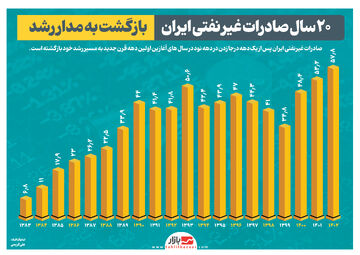TEHRAN (Bazaar)- Gergő Varga ,Tech Evangelist at SEON Technologies, and he's been working in fraud prevention and cybersecurity for over a decade now in interview with Bazaar News Agency says: Data privacy and security is a major issue that governments can through regulations.
Following is the full text of the interview:
Bazaar: How does artificial intelligence affect the efficiency of industries?
Varga: The main purpose of artificial intelligence is to support machines to perform various intellectual tasks like decision making, problem solving and perception based on different algorithms that humans would find difficult.
We can’t speak on behalf of all industries like pharmaceutical research, retail, marketing or process automation, since AI’s role is widely different in every industry. However, from our experience in fraud prevention, AI helps in the reinforcement of cybersecurity best practices and minimizes the attack surface rather than continually being on the lookout for different forms of attacks. Online commerce at this stage would be impossible without AI based decision making running in the background, approving or declining millions of transactions.
Bazaar: What are the important factors in the better performance of artificial intelligence in business?
Varga:AI gets the most out of data. When algorithms are self-learning, the data itself is an asset. The answers are in the data. You just have to apply AI to find them. Since the role of the data is now more important than ever, it can create a competitive advantage to help decision making.
For example, in our case, we’ve adapted a machine learning module that helps fraud managers find suspicious and risky patterns in the data while being respectful of false positives. This allows them to secure their payment systems from fraud attacks efficiently, in a way that's very difficult for criminals to outsmart.
Bazaar: What measures should governments take to facilitate the use of industrial intelligence?
Varga:Data privacy and security is a major issue that governments can mitigate through regulations.
A lot of AI applications are built upon massive volumes of data to learn and make logical patterns in decision making. Since machine learning systems depend highly on the personal data, it can oftentimes become a sensitive and personal topic.
There is the thorny subject of facial recognition - which itself runs on AI - which is facing legal scrutiny and calls for bans, while still being widely deployed in a variety of use cases.
These systems learn from the data and improve themselves. Due to this systematic learning, Machine Learning systems can become prone to data breach and identity theft. The EU has implemented the General Data Protection Regulation (GDPR) that ensures the protection of personal data.
Bazaar: What are challenges in using AI for organizations?
Varga:How good is your data? Your AI & ML models can suffer, and we can recall embarrassing cases where the training data itself contained some sort of bias (sampling or otherwise) that later tainted the results. Furthermore, as AI based reasoning is mostly opaque, the difficulty is with the humans accepting the results as correct. They have to make a leap of faith (trust the results), or you need systems that are as transparent as possible in their reasoning.
What many corporations have to overcome is this lack of trust by showing that even simple algorithms and machine learning technologies are efficient in everyone’s daily life.















نظر شما